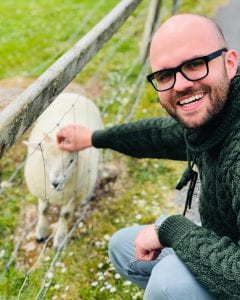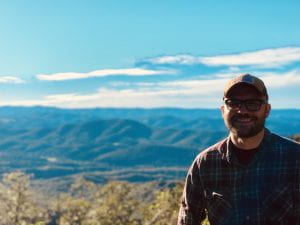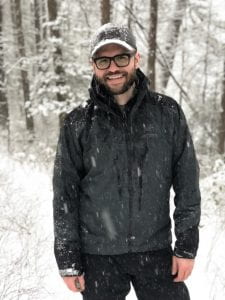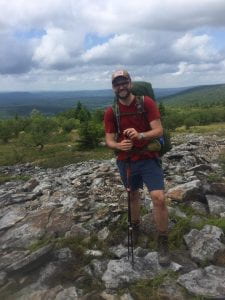Bradford Drewniak went to Towson University and graduated with a Bachelor of Science in Psychology back in 2016 and obtained a Master of Arts in Counseling Psychology in 2018. Bradford is a licensed clinical professional counselor, also known as a mental health therapist or LCPC, for short. Bradford specializes in working with teens and adults with anxiety, mood disorders, chronic stress, and adjustment concerns at a private group practice called Chesapeake Mental Health Collaborative in Towson, Maryland. Full disclosure, Bradford is also a former study abroad peer advisor.
Hi Bradford, tell me a little bit about yourself…where you studied abroad, what you studied, etc…
I’m originally from Maryland and those that know me, know my “obsession” with the outdoors, hiking, and camping. In fact, I started the hiking club at Towson back in 2013 as a way to channel that passion. During my undergraduate studies, I studied abroad twice. Both of those experiences were with Dr. David Earnest of the psychology department at the time, one of which was in Argentina back in 2014 and the other in Italy in 2015. Both of these programs had a similar focus wherein they took a look at both cultural differences between the U.S and Argentina/Italy as well as how those dynamics impact mental health treatment, how multinational business attempt to bridge cultural those cultural gaps, common factors across cultures, as well as how culture changes the valuation or prioritization of certain aspects of day to day life.
Were you nervous or apprehensive about studying abroad? I see that you went abroad twice so I imagine that it turned out to be a great experience!
I had always wanted to go abroad growing up. I remember having a world map on my wall when I was a kid and I would look at it and wonder what “that place” was like or what “that place” looked like. By studying abroad with a program, rather than solely buying a ticket to another country, I felt sense of support and guidance that we had allowed me to feel secure and confidently navigate my experience abroad. Consequently, on both occasions, I utilized studying abroad as a springboard for additional solo-adventure at the end of the programs in which I was able to further my exploration. Having a sense of familiarity before really embracing total immersion was immensely helpful in building my confidence as I ventured into unfamiliar environments, both culturally and geographically.
Was there anything about your experience abroad that surprised you, caught you off guard, or was unexpected?
I have to say that one of the biggest things that caught me off guard was how generous, kind, and accepting so many of the people were that I encountered in spite of linguistic barriers or cultural missteps. While I do have a limited working knowledge of Spanish, which helped in Argentina, I did not know any Italian prior to going to Italy. With that, in both countries, I found myself carefully trying to get a foothold of how to approach things like “how do I ask where this bus line is? How do I order food? How do I get to _____?” Given the hyper-polarizing language that has often used in modern day U.S.A, it was refreshing to see how the most defining aspect of my interactions abroad being that of empathy, kindness, and compassion. It was profoundly impact-full to be able to embrace that sense of vulnerability
and connection with those living in a very different context. Furthermore, these experiences, encouraged me to further check my privilege as it pertains to things I had taken for granted back home. Periodic perspective checks are very valuable in keeping us grounded in the reality of situations rather than allowing for a skewed narrative to take roots in our minds. Whether on a college campus, in your hometown, or abroad, these skills generalize and apply to nearly every interaction that we engage in.
It sounds like your programs had a big focus on the more intricate aspects of how culture impacts interactions and day to day behavior. What was that like as someone who studied psychology and is now a mental health therapist?
I’m glad that you bring that up! That is what initially caught my attention about these programs in the first place. While my education at Towson was absolutely critical in developing the skill set, knowledge, and critical thinking that I possess today, I felt as though my undergraduate education would not have been complete without an experiential component. For example, you can learn about the information, the context, and the background of any topic, culture, or interpersonal difference but if you do not take that information and apply it, in context, there is an opportunity lost to fully internalize that sense of understanding.
A significant portion of my role today is to not only be knowledgeable, present, and in tune with the needs that my clients bring in, but to also acknowledge the context of how their life has developed. Therefore, I continually remind my clients that THEY are the expert on their lived experience. Consequently, my work has a significant focus on democratizing and destigmatizing the therapy space. In fact, my practice is pioneering outdoor and walk-and-talk therapy sessions at local nature centers as a brings these ideas to fruition. Furthermore, these efforts are to move away from this expectation that “I have to go to this office, dump out all of these ‘negative’ emotions and this therapist will pick it apart.” It makes far more sense to work as team; the client being the expert on themselves, the therapist being the expert on interventions, theory, and skill-building. While I may have a high degree of training, expertise, and tools to help my clients, my process utilizes a significant degree of collaboration.
In studying abroad, one of the most significant lessons that I have learned is to never make assumptions. Humans internalize certain narratives about identities and while the age, race, gender, ethnicity, or other factors about a person sitting across from you may be evident at times, that does not equate to understanding, knowing, or being the expert of that lived experience. That person is not a carbon copy of whatever narrative we may have learned about that set of identities. I challenge folks to proceed curiously, openly, and with kindness. When we make assumptions, we give up an opportunity for learning, for understanding, and for connection. Studying abroad was instrumental in teaching me these things. I encourage you to reach out to the lovely folks at the study abroad office to start your own journey.




